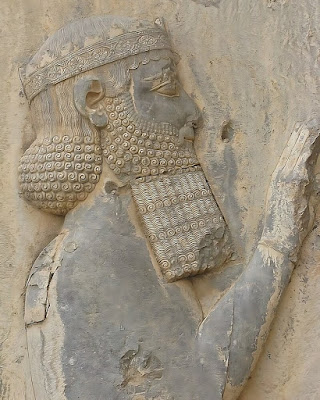"And Elijah said unto the prophets of Baal, Choose you one bullock for yourselves, and dress it first; for ye are many; and call on the name of your gods, but put no fire under. And they took the bullock which was given them, and they dressed it, and called on the name of Baal from morning even until noon, saying, O Baal, hear us. But there was no voice, nor any that answered. And they leaped upon the altar which was made. And it came to pass at noon, that Elijah mocked them, and said, Cry aloud: for he is a god; either he is talking, or he is pursuing, or he is in a journey, or peradventure he sleepeth, and must be awaked."
- The Hebrew Bible, "The First Book of the Kings," Chapter 18, Verses 25 through 27 (as translated by the King James Version of the Bible)
When I was a student at
Yavapai College (the little
school in my hometown), I was fortunate to take a class about world religions, in which we learned about everything from
Judaism to
Islam to
Buddhism. The class was called "comparative religions" at our
school, and it was the only time that I took a class about religion from a secular college. (We covered some world religions stuff in high school history, but I didn't have an entire class in world religions until early college.)
The value of religion classes at secular schools
My church offers some fine world religions classes through its Institute program, which are well-recommended to those with access to them. But it was good to get some instruction about this from a secular school, where I could hear perspectives from people outside of my faith. The class was taught by a
Jewish lady, incidentally - someone who brought an interesting perspective to the class. We also had a Hindu student in the class, who could read the Hindu holy language of
Sanskrit. It all combined together to make an interesting class.
The value of religion classes at private religious schools
But the finest classes that I've taken in religion were not the comparative ones offered by secular schools, but the ones taught by
my church about its own beliefs. I'm sure devotees of other religions can understand a bias toward one's own faith, and I am no exception to the rule - I am a great fan of my church's religion classes. I took some classes through my church's Seminary in high school, and then some classes through its Institute in college. (In our faith, Seminary classes are geared towards high school students, while Institute classes are geared towards college students.) The classes focused on topics like the
Old Testament and the
New Testament, as well as scriptures unique to
The Church of Jesus Christ of Latter-Day Saints such as the
Book of Mormon and
Doctrine & Covenants. Thus, I learned a lot from these classes. There are also many classes about
church history as well, including one for church history since 1900. This was a little unusual, given the church's more typical focus on earlier history; but it was an excellent class, and I greatly enjoyed it.

















